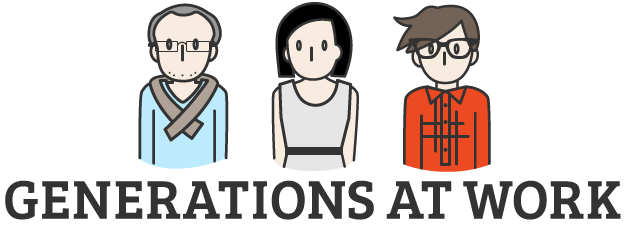While there may be some minor generational differences in workplace preferences, the truth is ALL your people want to learn, grow, use their strengths and be recognized and appreciated for their efforts. I’ve written extensively about the myth that Millennials are fundamentally different than other generations. The real point is that someone at that life stage has different needs. This article is all about how to meet the varying needs of a diverse workforce.Â
 In the book “Born for This,” author Chris Guillebeau tells the story of a supervisor that approached his organization’s management team in order to secure a small budget for pizza to celebrate his team’s wins and hard work. However, the management team denied the request, prompting the supervisor to leave his job and start his own firm. Today, he sees these opportunities for investing in employees as a key differentiator between his organization and the competition.
In the book “Born for This,” author Chris Guillebeau tells the story of a supervisor that approached his organization’s management team in order to secure a small budget for pizza to celebrate his team’s wins and hard work. However, the management team denied the request, prompting the supervisor to leave his job and start his own firm. Today, he sees these opportunities for investing in employees as a key differentiator between his organization and the competition.
This story exemplifies the value of focusing on employees. It’s not just about dollars spent — it’s about loyalty, satisfaction and engagement that result when individuals feel like their employer truly cares about them. The value of creating the kind of environment where employees feel appreciated is a trade off in increased performance, effort and quality. This understanding is a key reason, according to CFO Magazine, why 80 percent of U.S. financial leaders are taking the appropriate measures to improve employee retention.
Current Generations and Their Values
Business leaders are not strangers to the conversation about generations in the workplace. The shifting baby boomer population is creating a domino effect in many organizations, but for the foreseeable future organizations will still have four generations in the workforce: baby boomers, Gen Xers, millennials and Gen Zers.
1. Baby Boomers
Baby boomers are delaying retirement, which may put pressure on subsequent generations for senior level positions and key leadership roles. In reality, members of this group have an immense amount of knowledge and skills and are looking for a way to share them before they ultimately retire. Instead of coasting into retirement, they are looking for ways to stay actively involved and engaged, even if only on a part-time basis.
2. Generation X
Generation X workers are sandwiched between a large population of baby boomers and an even larger population of millennials. This group is starting to focus on future-oriented areas like retirement but at the same time many are climbing the career ladder and looking for ways to continue advancing as baby boomers make their exit from the workforce. Coaching and leadership development are critical for these individuals.
3. Millennials
According to the ADP Research Institute® report, Strategic Drift: How HR Plans for Change, millennials are looking for opportunities to learn, grow and advance their careers. One organization cited in the report says that millennials’ reputation for changing jobs often reflects the failure of organizations to train them — not the picture of disloyalty often painted in the media. This group is ready to advance, which presents a winning combination for baby boomers looking to share their years of wisdom with an eager audience.
Video has become an increasingly popular tool for developing millennial employees. As a generation with a clear interest in learning and progression (with an affinity towards technology), millennials value the opportunity to learn at their own pace outside the rigid confines of the training room. This is where video can help. As research from specialized companies like IG1 Communications has shown, video has a 10x engagement rate for millennials over other training methods while also bringing down costs and training times making it an enticing option for HR departments.
4. Generation Z
Gen Zers are just entering the workplace. The Society for Human Resource Management (SHRM) notes, “With Gen Z coming of age during the recession, they are putting money and job security at the top of the list. Sure, they want to make a difference, but surviving and thriving are more important. The cultures that can foster that are the ones that will win the war for talent with Gen Z.” It’s important to see this in the context of the other demographic groups to understand how best to motivate these workers.
Meeting the Needs of a Diverse Workforce
The lesson for finance leaders is to keep these varying interests in mind when considering areas of investment on the employee side of the equation. For instance, mentorship and career development programs could be a pro for millennials, but it takes the involvement of baby boomers and other experienced workers to make the relationships work. Benefits also run the gamut, depending on the demographic in question:
- Gen Xers may be looking for leave options to care not only for children, but for aging parents
- Many millennials are looking for help with repaying crushing student loan debts
- Baby boomers may have an interest in near-term retirement planning
- Gen Zers are focused on collecting experiences, which means volunteerism may be more important than just another vacation day
Clearly, a one-size-fits-all approach to benefits will not cut it for this diverse group.
The ROI of Employee Engagement
While it’s nice to consider the prospect of increasing employee engagement just for the sake of it, the truth is there needs to be business value tied to the practice. I talked about this extensively in my interview with Ohio Living CHRO Dana Ullom-Vucelich and how her firm has seen incredible value from more engaged staff.
Additionally, Forbes reports that in hospitals, teams with more engaged employees lead to fewer readmissions, increasing patient satisfaction scores. Improvements in employee engagement can lead to higher retention. It’s important to note that while each organization may be different, there is always value in creating a positive, engaging workplace for employees.
While there may be some generational differences in workplace preferences, most people want to learn, grow, use their strengths and be recognized and appreciated for their efforts. Finance leaders that can invest in programs that support that will likely see the value that an engaged workforce can deliver to the bottom line.
I originally published this piece on the ADP blog:Â https://www.adp.com/spark/articles/2018/12/what-does-it-look-like-to-invest-in-all-4-generations-of-employees.aspx
“Parts of this article are brought to you by IG1 Communications via Presscast.io“.

